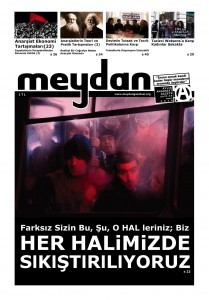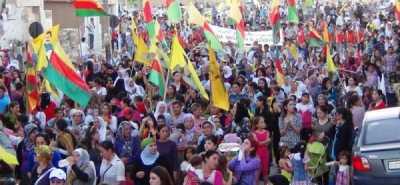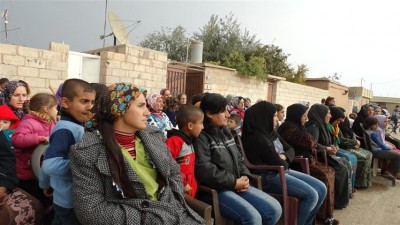This is an excerpt from an article by Dilar Dirik, “Radical Democracy: The First Line Against Fascism,” in which she argues that the radical direct democracy being created in Rojava in northern Syria is a crucial weapon in the fight against ISIS and fascism. In this excerpt, she draws the connections between ISIS, fascism, capitalism and patriarchy. In Volume One of Anarchism: A Documentary History of Libertarian Ideas, I included some classic anarchist critiques of fascism by Luigi Fabbri, Rudolf Rocker and Alex Comfort. Dirik’s article originally appeared in Roar magazine.
A Product of Capitalist Modernity
There have been many attempts to explain the phenomenon of ISIS and its appeal to thousands of young people, especially considering the brutality of the organization’s methods. Many came to the conclusion that those who live under ISIS often serve the group because of fear or economic rewards. But clearly thousands of people worldwide voluntarily joined the atrocious group not despite, but precisely because of its ability to commit the most unthinkable evils. It seems that it is not religion, but a cruel, merciless sense of power — even at the cost of death — radiating from ISIS that attracts people from across the globe to the extremist group.
Single-factor theories generally fail to consider the regional and international political, economic, social context that enables an anti-life doctrine like that of ISIS to emerge. We must acknowledge ISIS’ appeal to young men, deprived of the chance to be adequate, decent human beings, without justifying the group’s mind-blowing rapist, genocidal agenda or removing the agency and accountability of individuals who commit these crimes against humanity. It is crucial to contextualize the sense of instant gratification in the form of authoritarian power, money and sex that ISIS offers in a cancerous society under patriarchal capitalism, which renders life meaningless, empty and hopeless.
Pathologizing the appeal of ISIS behind the backdrop of the so-called “war on terror,” instead of situating it in the context of wider institutions of power and violence which in interplay generate entire systems of authoritarianism, will not allow us to begin to understand what drives “good boys” from Germany to travel to the Middle East to become slaughterers. And yet ISIS is only the most extreme manifestation of a seemingly apocalyptic global trend. With the recent shift towards authoritarian right-wing politics worldwide, one word — once considered banished from human society forever — has re-entered our everyday lives and our political lexicon: fascism.
Clearly, there are immense differences between the contexts, features and methods of various fascist movements. But when it comes to its hierarchical organization, authoritarian thought process, extreme sexism, populist terminology, and clever recruitment patterns, capitalizing on perceived needs, fears or desires among vulnerable social groups, ISIS in many ways mirrors its international counterparts.
Perhaps we can think of fascism as a spectrum, in which established states on top of the capitalist world-system have the means to reproduce their authority through certain political institutions, economic policies, arms trade, media and cultural hegemony, while others, in reaction, rely on more “primitive” forms of fascism, such as seemingly random extremist violence. There are clear parallels in how fascists everywhere rely on a regime of paranoia, mistrust and fear to strengthen the strong hand of the state. Those who challenge their enemies are labelled “terrorists” or “enemies of God” — any action to destroy them is permissible.
Fascism strongly relies on the complete lack of decision-making agency within the broader community. It is nourished by a climate in which the community is stripped of its ability to initiate direct action, express creativity and develop its own alternatives. Any form of solidarity and any loyalty directed at anything or anyone other than the state must be systematically eradicated, so that the isolated, individualized citizen is dependent on the state and its policing institutions and knowledge systems.
That is why one of the most critical pillars of fascism is capitalism, as an economic system, ideology and form of social interaction. In the value system of capitalist modernity, human relations need to be reduced to mere economic interactions, calculable and measurable by interest and profit. It is easy to see capitalism’s ability to dispose of life in the name of larger interests as running parallel to ISIS’ wasting of lives for the sake of its pseudo-caliphate of rape, pillage and murder.
The Oldest Colony of All
Perhaps most crucially, fascism could never emerge if not for the enslavement of the oldest colony of all: women. Of all oppressed and brutalized groups, women have been subjected to the most ancient forms of institutionalized violence. The view of women as war spoils, as tools in the service of men, as objects of sexual gratification and sites to assert ultimate power persists in every single fascist manifesto. The emergence of the state, together with the fetishization of private property, was enabled above all by the submission of women.
Indeed, it is impossible to assert control over entire populations or create deep-cutting social divisions without the oppression and marginalization of women, promoted in male-dominated history-writing, theory production, meaning-giving practices, and economic and political administration. The state is modelled after the patriarchal family and vice versa. All forms of social domination are at some level replications of the most comprehensive, intimate, direct and harmful form of slavery, which is the sexual subjugation of women in all spheres of life.
Different structures and institutions of violence and hierarchy — such as capitalism or patriarchy — have distinct features, but fascism constitutes the concentrated, inter-related, systematized collaboration between them. And this is where fascism and capitalism, together with the most ancient form of human domination — patriarchy — find their most monopolized, systematic expressions in the modern nation-state.
Previous regimes over the course of history had despotic characters, but always relied on moral codes, religious theologies and divine or spiritual institutions to be seen as legitimate by the population. It is a particularity of capitalist modernity that it sheds all pretentions and claims to morality in relation to law and order, and exposes its obscenely destructive systems for the sake of nothing but the state itself.
Without the hierarchical, hegemonic nature of the state, which monopolizes the use of force, the economy, official ideology, information and culture; without the omnipresent security apparatuses that penetrate all aspects of life, from the media to the bedroom; without the disciplinary hand of the state as God on Earth, no system of exploitation or violence could survive. ISIS is a direct product of both: ancient models of hierarchy and violence, as well as capitalist modernity with its particular mindset, economy and culture. Understanding ISIS — and fascism more generally — means understanding the relationship between patriarchy, capitalism and the state.
Dilar Dirik, April 2017











































